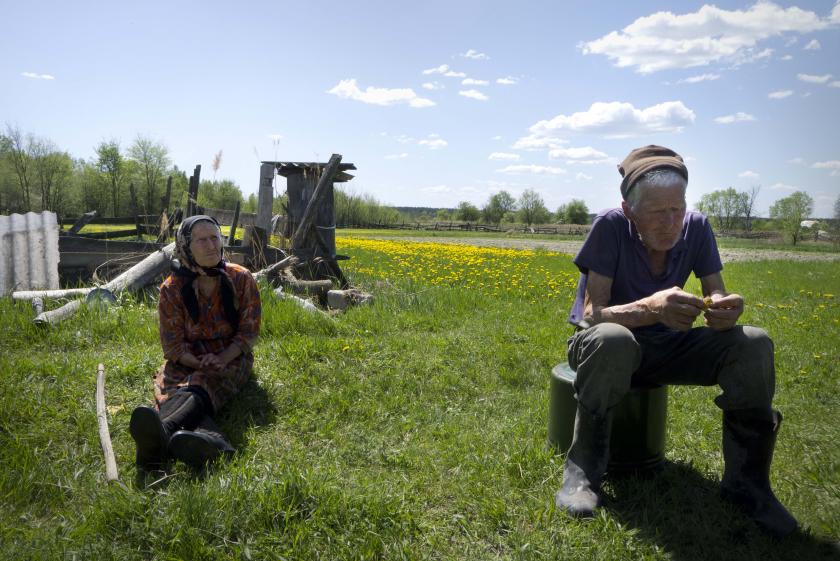Berlin are, misleadingly, an arts unit from Antwerp, Belgium. They’ve been around for well over a decade and major in artily constructed documentaries that are presented in the manner of experiential installations. Their focus is usually the slow, commentary-free dissection of a geographical quirk or circumstance, hence past films have been about and titled Jerusalem, Moscow, Iqaluit (Canadian Inuit capital), and Bonanza (a tiny Rocky Mountains community).
This time it’s the turn of Zvizdal, a Ukrainian village that falls within the Chernobyl isolation zone, and its two remaining inhabitants, the increasingly geriatric Pétro and Nadia “Baba” Lubenoc, who insisted on staying when everyone else was evacuated after the atomic disaster of 1986.
Dealing with the installation aspect first, the film is shown on both sides of a screen with the audience on raised seating either side, the whole within an area cubed off with black material inside the much larger Corn Exchange. We are told as we go in that no food or drink (apart from bottled water) is allowed, and that if we leave we will not be allowed back in. I am unconvinced this disciplinary approach will increase artistic appreciation, but it certainly creates a frisson of theatrical anticipation.
It's an unblinking look at the gradual process of ageing and dying Beneath the screen are three exquisitely rendered miniatures of the Lubenocs’ ramshackle rundown farm – in Summer, snowy Winter, and Autumn. They revolve, from time to time, and a GoPro-style camera, attached to the underside of the screen, whirrs up and down filming footage from them that’s cleverly intercut with the film by two shadowy figures at computers.
In the end, however, the event stands or falls on the film itself. Where some of Berlin’s previous work has focused on humanity’s inability to live happily with itself, Zvizdal is about isolation and ageing. There is a real fascination with seeing the Lubenoc’s circumstances, days away from any fellow human beings, amid an agrarian post-apocalyptic countryside. Pétro gives a brief tour of what was once his community, now overgrown by nature, but the film mostly focuses on the pair going about their medieval daily lives, all sickles and scythes, cow-milking and the daily killing of bugs on their potato field by hand. They also have a very sickly-looking horse, but say they subsist on a potato soup, made every day from the remains of the day before’s.
This routine is interrupted only once – at least until near the end of the film's 75-minute length – and that’s when, on Commemoration Day in May, the big celebration of victory over the Nazis, the village's long-gone inhabitants drive through to pay tribute to their dead. The Lubenocs are clearly excited by this sudden human contact in their lonely existence, and Pétro intimates he’d be happy to leave Zvizdal. Nadia is less keen. The pair spend most of the film saying “Oh my god” a lot, bemoaning their harsh lives, which grow increasingly impossible as they become more and more decrepit. As much as anything else, it's an unblinking look at the gradual process of ageing and dying, albeit spiked by the couple's enjoyably flinty humour.
There are silly mistakes in the subtitles – “burry” instead of “bury”, “filed” instead of “field”, etc. – but, overall, with or without the accompanying design and technology art installation angle, Zvizdal is an intriguing conceptual meditation: slow, existential, quietly beautiful, and worthwhile.













Add comment